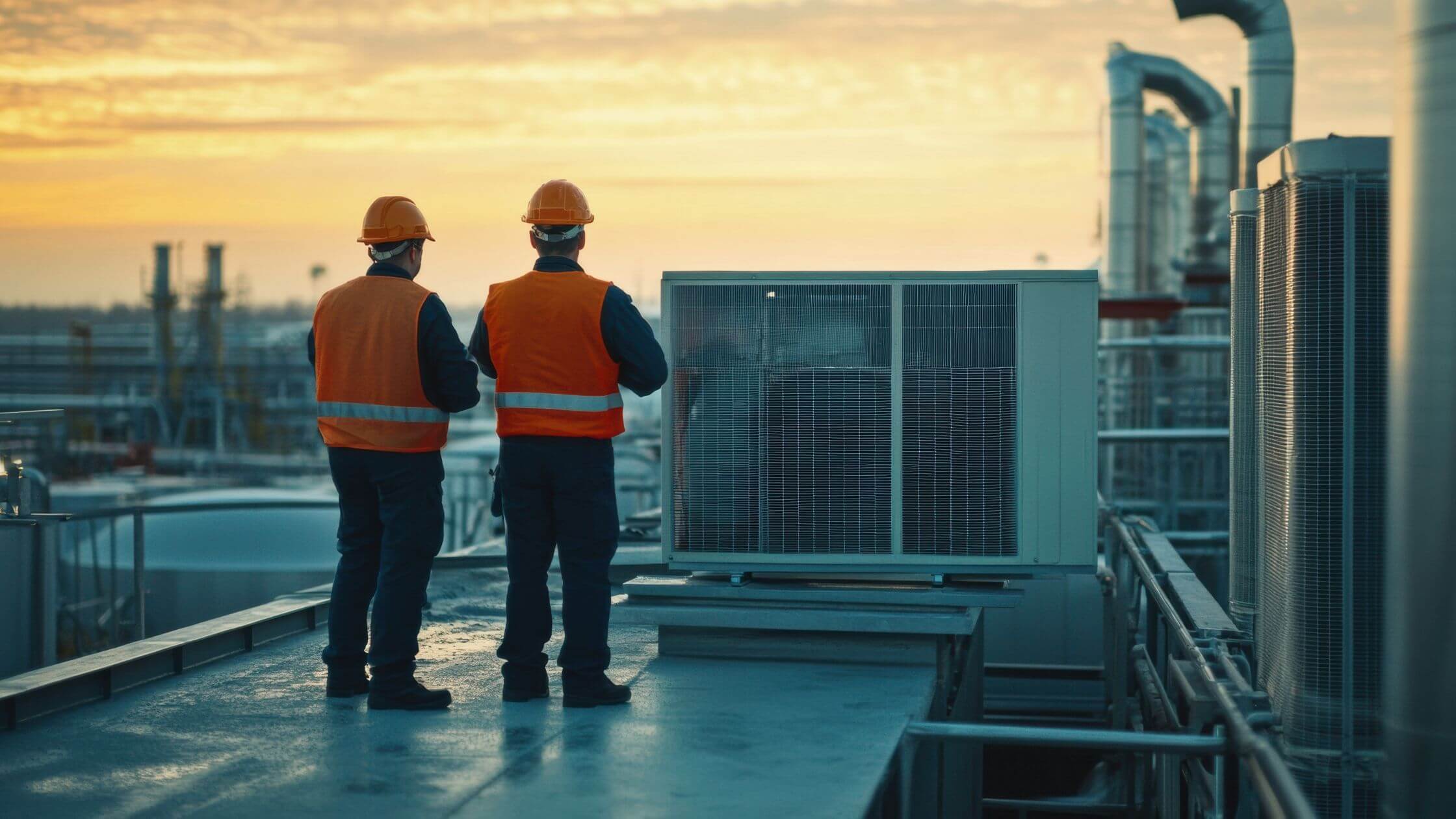In today’s fast-paced industrial environment, the efficiency and reliability of cooling systems are paramount. Commercial and air conditioner maintenance is crucial for ensuring building safety and operational efficiency in industrial settings. Air conditioning units (aircons) play a critical role in maintaining optimal working conditions, protecting sensitive equipment, and ensuring employee comfort.
Regular maintenance of these systems is essential not just for prolonging their lifespan, but also for maximizing productivity and minimizing operational costs. In this blog post, we will explore the fundamental aspects of aircon maintenance for industrial efficiency and reliability.
When it comes to maintaining air conditioning systems in industrial settings, several common challenges and problems can arise. Addressing these issues is crucial for ensuring the efficiency and reliability of the systems. Here are some of the most prevalent challenges:
Neglecting Regular Maintenance:
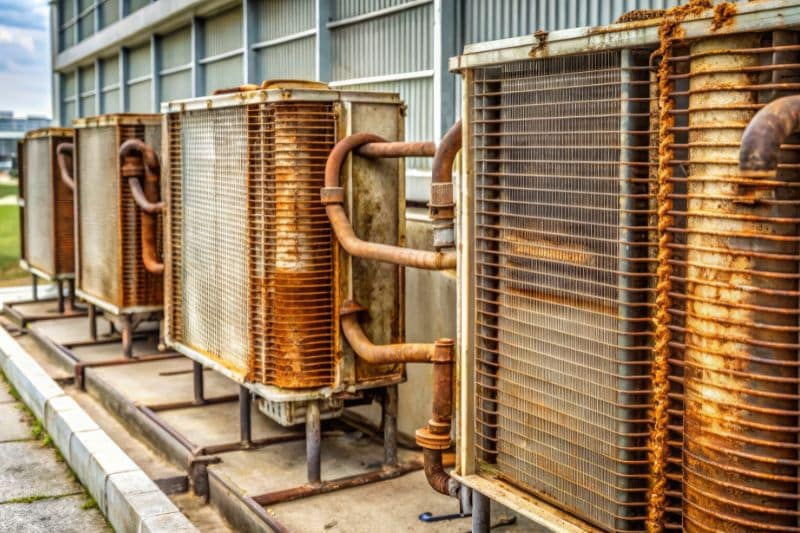
- Problem: Many industrial facilities delay or skip regular maintenance due to time constraints or budgetary concerns.
- Solution: Implement a strict maintenance schedule and allocate budget resources specifically for HVAC upkeep to prevent costly breakdowns.
Inadequate Training of Maintenance Staff:
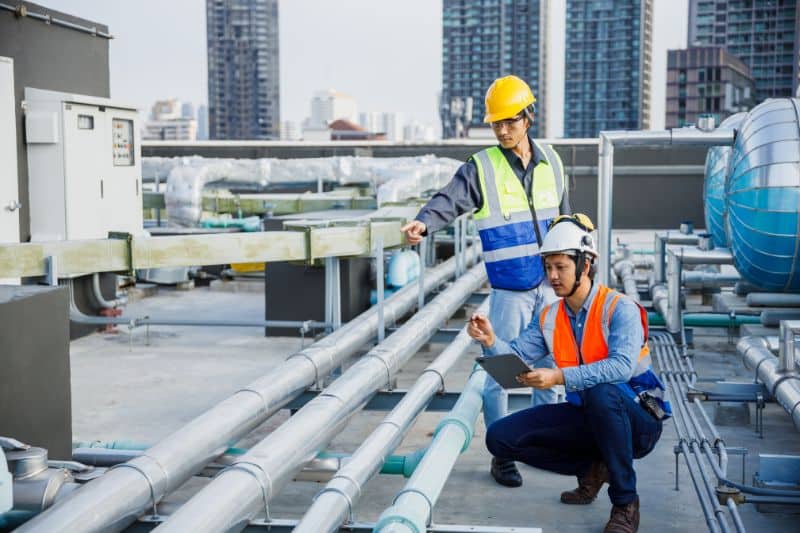
- Problem: Maintenance personnel may lack the necessary training to handle complex air conditioning systems effectively.
- Solution: Invest in regular training programs to ensure that staff are up-to-date with the latest maintenance techniques and technologies.
Poor Air Quality Management:
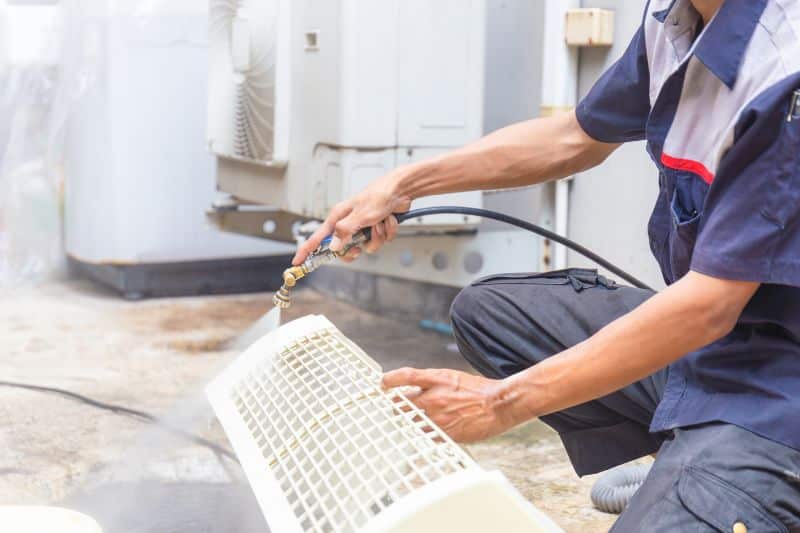
- Problem: Accumulation of dust, debris, and other pollutants can degrade air quality and system performance.
- Solution: Regularly clean and replace air filters, and ensure that ductwork is inspected and cleaned to maintain optimal air quality.
Refrigerant Leaks:
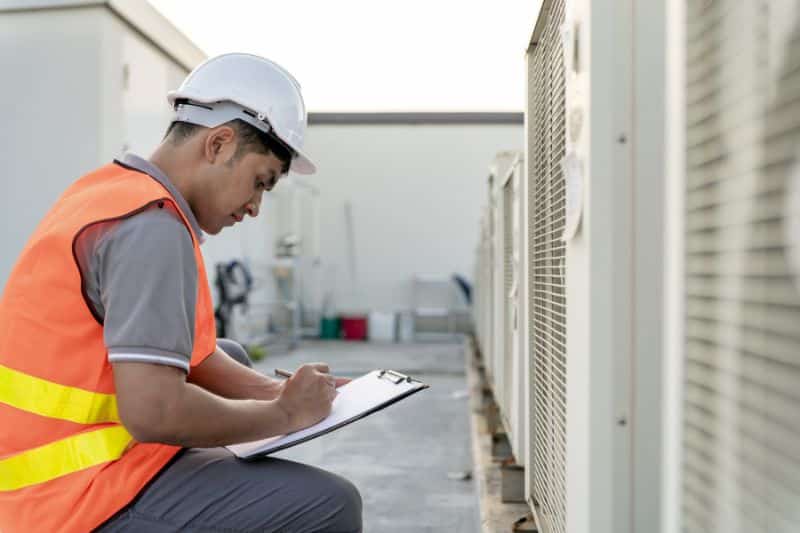
- Problem: Leaks can lead to reduced cooling efficiency and increased energy consumption.
- Solution: Conduct regular inspections to detect and repair leaks promptly, and ensure refrigerant levels are maintained.
Inconsistent Temperature Control:
- Problem: Faulty thermostats or uneven cooling can lead to discomfort and inefficiency.
- Solution: Regularly calibrate and test thermostats, and consider upgrading to smart thermostats for better control and efficiency.
Energy Inefficiency:
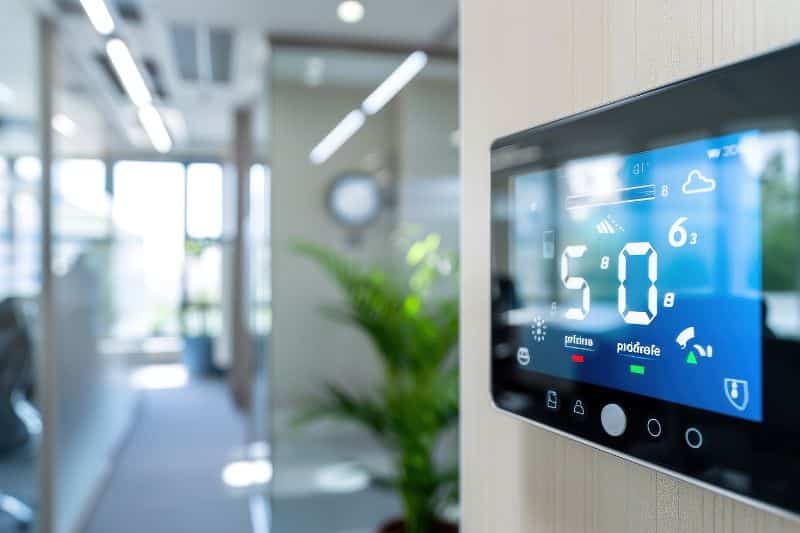
- Problem: Older systems or poorly maintained units can consume excessive energy, leading to high operational costs.
- Solution: Upgrade to energy-efficient models and ensure regular maintenance to keep systems running optimally.
System Overload:
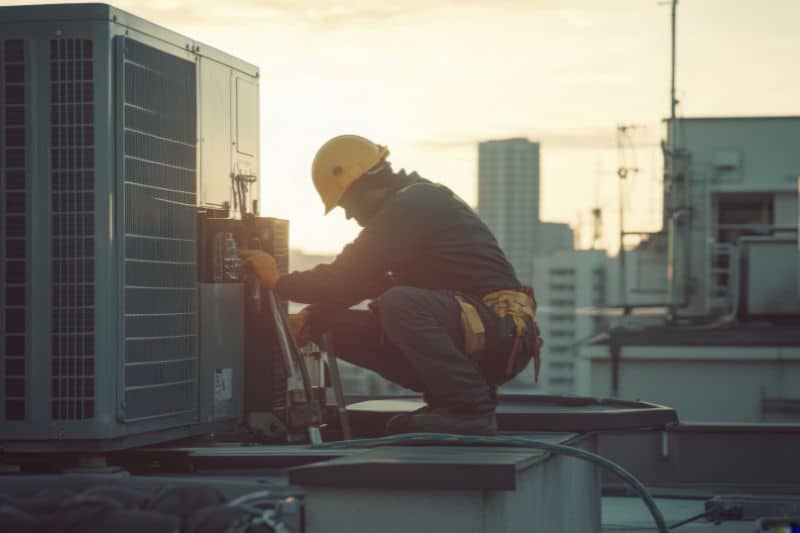
- Problem: Air conditioning systems may be overworked due to increased demand or improper sizing.
- Solution: Conduct a load analysis to ensure systems are appropriately sized for the facility’s needs, and consider adding supplementary units if necessary.
Corrosion and Wear:
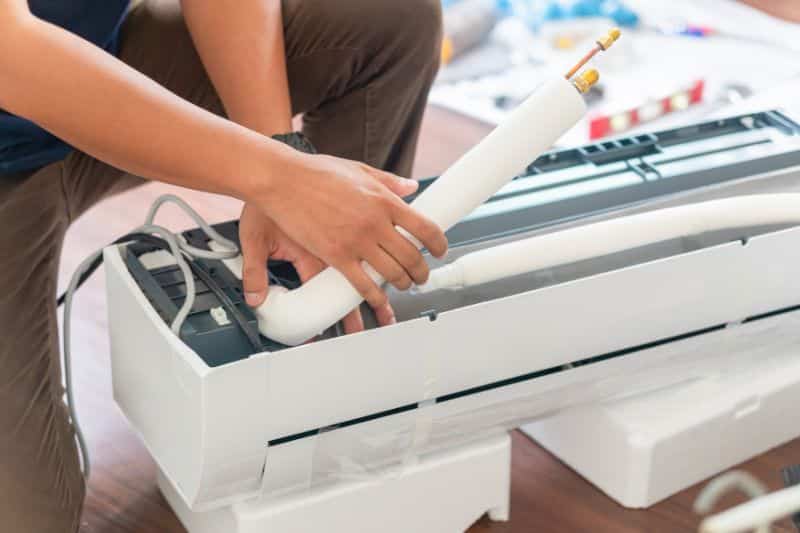
- Problem: Industrial environments can be harsh, leading to corrosion and wear on system components.
- Solution: Use corrosion-resistant materials and coatings, and perform regular inspections to identify and replace worn parts.
Lack of Spare Parts:
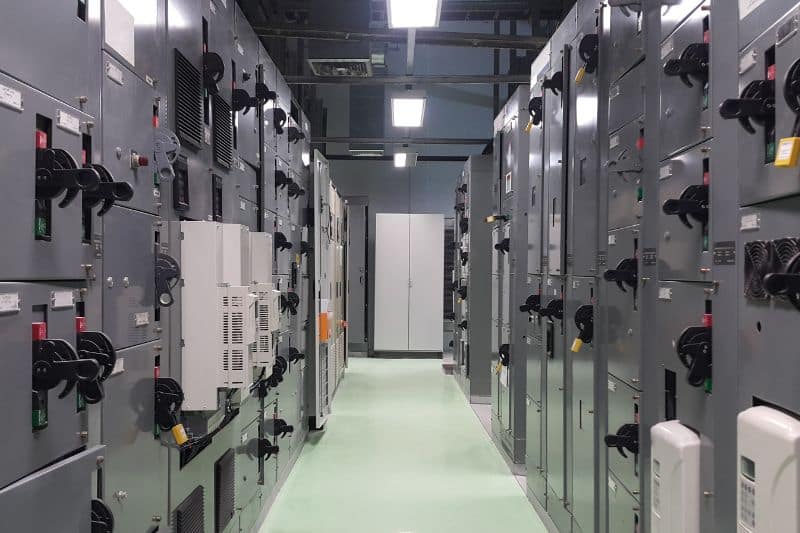
- Problem: Delays in obtaining spare parts can prolong downtime during repairs.
- Solution: Maintain an inventory of critical spare parts and establish relationships with reliable suppliers to ensure quick access when needed.
Compliance with Regulations:
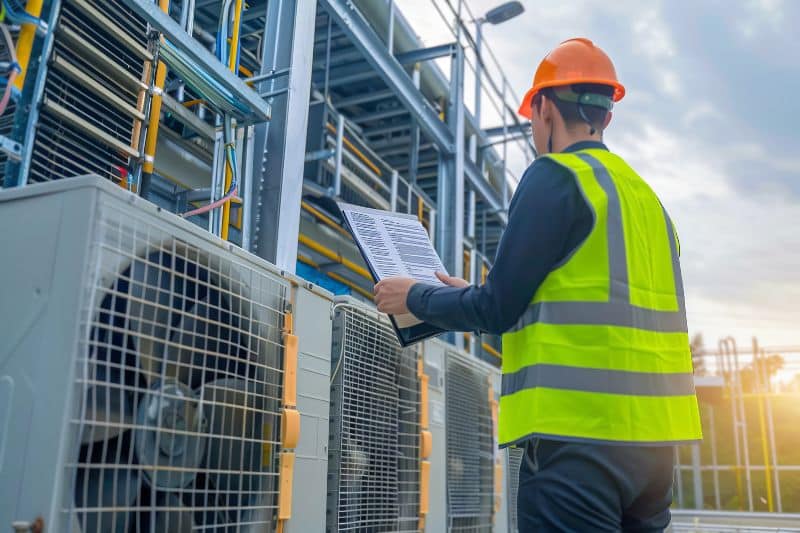
- Problem: Failing to comply with environmental and safety regulations can result in fines and legal issues.
- Solution: Stay informed about relevant regulations and ensure that maintenance practices align with legal requirements.
By proactively addressing these challenges, industrial facilities can enhance the performance and reliability of their air conditioning systems, ultimately leading to improved operational efficiency and reduced costs.
The Importance of Regular Maintenance for Your Air Conditioning System
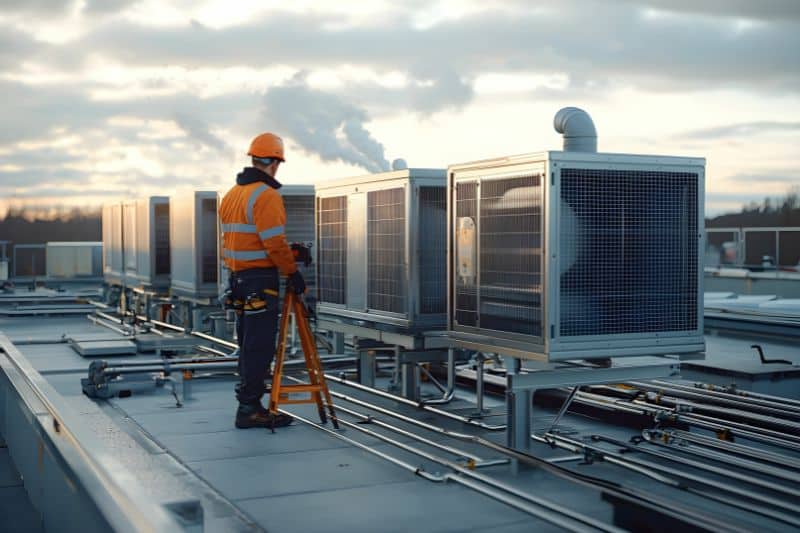
1. Enhanced Performance
Regular maintenance ensures that your AC unit operates at its best efficiency. Dust and debris can accumulate in filters, coils, and ducts, restricting airflow of cool air and causing the system to work harder. This inefficiency can lead to increased your energy use and consumption, higher utility bills, and unnecessary strain on the equipment.
2. Increased Longevity
Just like any other piece of industrial equipment, air conditioning systems require regular check-ups regular inspection and servicing to function optimally over the long term. Neglecting maintenance can lead to significant issues, including major breakdowns that may require costly repairs or complete replacement of the unit.
3. Improved Indoor Air Quality
In industrial settings, maintaining good air quality is crucial for the safety and well-being of employees. Regular maintenance, including cleaning or replacing the air conditioner filters, helps to eliminate contaminants and allergens, ensuring that the air circulated throughout the facility is clean and safe to breathe.
4. Compliance with Regulations
Many industries are subject to strict environmental regulations regarding emissions and air quality. Regular using HVAC systems and maintenance of air conditioning systems helps ensure compliance with these regulations, reducing the risk of fines and enhancing the company’s reputation.
Understanding Industrial Air Conditioning Units
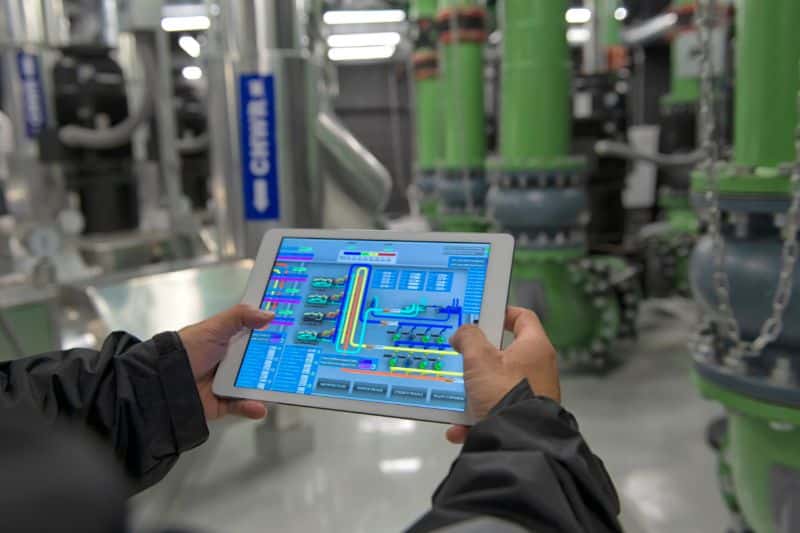
1. Types of Industrial Air Conditioning Systems
Aircon maintenance for Industrial systems come in various configurations, each tailored to meet specific operational needs and environmental conditions. Here are some of the most prevalent types:
- Packaged Systems: These self-contained units house all essential components, including the compressor, condenser, and evaporator, within a single enclosure. Packaged systems are ideal for facilities requiring a compact and straightforward installation.
- Split Systems: Comprising an outdoor unit and an indoor unit, split systems offer flexibility and efficiency. The outdoor unit contains the compressor and condenser, while the indoor unit houses the evaporator and fan, making them suitable for larger spaces with varying cooling needs.
- Chiller Systems: Utilizing a chiller to cool water, these systems circulate the chilled water throughout the building to provide consistent cooling. Chiller systems are particularly effective for large-scale industrial applications where precise temperature control is crucial.
- Heat Pump Systems: Versatile and efficient, heat pump systems can provide both heating and cooling. They are a popular choice for industrial settings that require year-round climate control, leveraging the same system for both functions.
2. Key Components and Their Functions
Understanding the key components of airrcon maintenance for Industrial units is essential for effective maintenance and operation. Here are the primary components and their roles:
- Compressor: The heart of the air conditioning unit, the compressor pressurizes the refrigerant, enabling it to absorb and release heat efficiently. This process is vital for the cooling cycle.
- Condenser Coils: Located in the outdoor unit, the condenser coils dissipate heat from the refrigerant into the surrounding air. Clean and well-maintained condenser coils are crucial for optimal heat exchange and system efficiency.
- Evaporator Coil: Situated in the indoor unit, the evaporator coil absorbs heat from the indoor air, cooling it before it is circulated back into the space. Regular cleaning of the evaporator coil ensures effective heat absorption and cooling performance.
- Air Filters: Air filters trap dust, dirt, and other airborne particles, preventing them from entering the air conditioning unit. Clean air filters are essential for maintaining good airflow, system efficiency, and indoor air quality.
- Thermostat: The thermostat regulates the temperature of the air conditioning unit, ensuring it operates within the desired range. Accurate thermostat settings are key to maintaining consistent indoor temperatures and energy efficiency.
Essential Maintenance Tasks
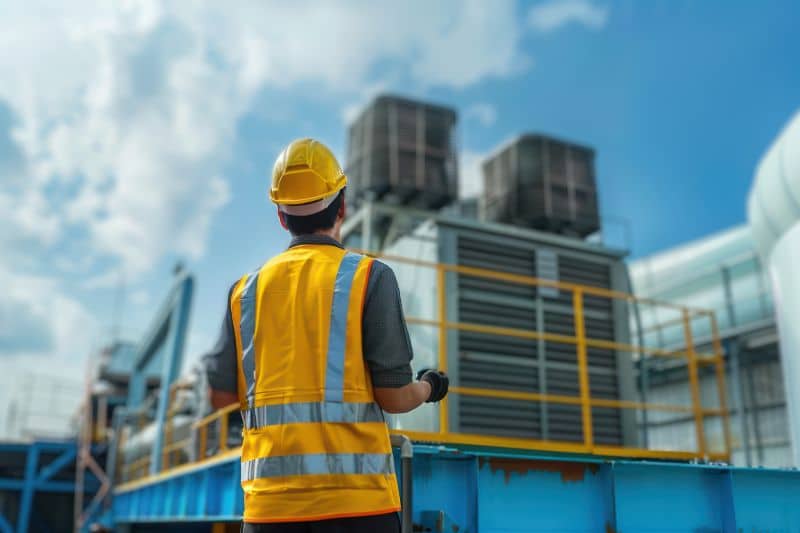
To fully benefit from aircon maintenance, several key tasks should be performed regularly:
1. Cleaning and Replacing Air Filters
One of the simplest yet most effective maintenance tasks is cleaning or replacing air filters. This should be done monthly or as recommended by the front air ducts manufacturer. Clean filters improve airflow, enhance the efficiency of the system, and contribute to better air quality.
2. Checking Refrigerant Levels
Low refrigerant levels can lead to decreased cooling efficiency and increased energy consumption. Regular checks should be conducted to ensure that desired temperature of the refrigerant is at appropriate levels and that there are no leaks in the system.
3. Inspecting Ductwork
Ductwork can accumulate dust and debris, leading from debris buildup to obstructions that affect airflow. It’s important to inspect and clean ductwork regularly to maintain optimal performance enhanced air quality and prevent the buildup of harmful particles in the air.
4. Cleaning Condenser Coils
The evaporator and condenser coils in ac system should be checked and cleaned regularly. Dirty coils hinder the heating and cooling process, leading to increased energy usage and decreased efficiency. A professional service can conduct comprehensive cleaning that may be difficult to accomplish in-house.
5. Checking the Thermostat
A malfunctioning thermostat can lead to improper temperature control, putting additional stress on the air conditioning system. Regular checks and recalibrations ensure that the thermostat is working correctly and providing accurate temperature readings.
6. Scheduling Professional Maintenance
While many tasks can be performed in-house, scheduling professional maintenance at least once a year is crucial. Qualified technicians can conduct thorough inspections, pinpoint potential issues before they become significant problems, and perform necessary repairs.
Considering professional air conditioning (AC) maintenance for your industrial HVAC system is essential for several key reasons. The complex nature of industrial HVAC systems, combined with the specific demands of an industrial environment, makes professional expertise invaluable. Here are some compelling reasons to prioritize professional industrial hvac system AC maintenance:
1. Expertise and Experience
- Technical Knowledge: Professional technicians have the training and experience necessary to understand the intricacies of industrial air conditioning systems. They are equipped to identify and troubleshoot issues that may not be apparent to non-professionals.
- Up-to-Date Practices: Industry standards and technologies evolve. Professionals stay informed about the latest advancements in HVAC technology and maintenance practices, ensuring your systems operate efficiently.
2. Comprehensive Inspections
- Thorough Assessments: Professionals conduct comprehensive inspections that cover all components of the system, from ductwork to refrigerant levels. This detailed approach helps uncover potential issues before they become significant problems.
- System Optimization: By evaluating the system’s performance, technicians can make recommendations for improvements that enhance efficiency and reliability.
3. Preventative Maintenance
- Schedule Regular Maintenance: Professional services typically offer scheduled maintenance programs that ensure your AC systems receive consistent care, minimizing the likelihood of unexpected breakdowns.
- Proactive Problem-Solving: Routine maintenance can identify and resolve minor issues before they escalate into costly repairs or downtime.
4. Improved Energy Efficiency
- Cost Savings: Regular professional maintenance helps maximize the efficiency of your AC systems, leading to lower energy bills. Well-maintained systems consume less energy while providing optimal cooling.
- Sustainability Benefits: Improved efficiency contributes to reduced environmental impact, aligning with sustainability goals.
5. Health and Safety Compliance
Air Quality Assurance: Professional maintenance includes cleaning and replacing filters, inspecting ductwork and electrical connections, and ensuring proper ventilation, which improves indoor air quality critical to employee health. This includes not only air conditioner the cooling systems but also the heating system, which requires regular maintenance to ensure optimal performance throughout the year.
Regulatory Compliance: Professionals ensure that your HVAC systems comply with local and national regulations, reducing the risk of fines or legal issues.
6. Longer Equipment Lifespan
Component Care: Regular maintenance extends the lifespan of your air conditioning systems, protecting your investment and delaying the need for costly replacements. Neglecting maintenance can lead to poor indoor air quality, which can cause health issues and reduce the overall efficiency of the cooling system itself.
Reduced Wear and Tear: By doing frequent repairs and addressing minor issues promptly, professionals help minimize wear and tear on system components.
7. Customized Solutions
- Tailored Maintenance Plans: Professional services can provide maintenance plans specifically designed for your facility’s unique needs, taking into account the size, usage, and environmental conditions.
- System Upgrades: Technicians can recommend and implement upgrades or modifications that enhance the system’s performance based on your business’s operational requirements.
8. Minimizing Downtime
- Rapid Response: In the event of a breakdown, professional maintenance services often have the capability to respond quickly, minimizing system downtime. This is crucial for maintaining productivity in an industrial setting.
- Emergency Services: Many professional maintenance providers offer 24/7 services, ensuring that issues can be addressed promptly, even during off-hours.
Conclusion

Proper maintenance of industrial air conditioning systems is non-negotiable for ensuring efficiency, safety controls and reliability. By committing their air conditioners to a regular maintenance schedule and addressing key tasks proactively, businesses not only enhance the performance of their cooling systems but also save money in the long run, improve air quality, and ensure compliance with industry regulations.
Investing in aircon maintenance is investing in the overall efficiency and safety of the industrial environment. Don’t wait for problems to arise—start your industrial ac- maintenance plan today to keep your operations running smoothly.

